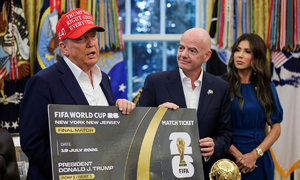China is under attack by the U.S. and other countries by its failure to abide by the international trade and investment rules. It is asserted that China is particularly deficient in the protection of intellectual property, coupled with demands that such property be transferred to Chinese-owned or controlled entities as part of the price for the privilege of doing business in China. China has a long record of copyright piracy and counterfeiting products. Even though China is not the worst offender, it is considered the biggest problem because of the sheer size of its economy (Number 2 in the world), which is why the U.S. has aimed its sanctions at China.
Protection of intellectual property, including copyrights, trademarks, patents and know-how, as well as trade secrets, databases, plant varieties, etc., is now often more critical to the success of a business than physical property. Intellectual property has been recognized as needing protection for several hundred years.
The U.S. Constitution explicitly recognizes the need for and authorizes the creation of the necessary agencies of government, such as the patent office, to protect intellectual property. Intellectual property law was developed to encourage the creation of the development of new goods and services. Protection for new innovations is normally given for some stipulated period of time.
In recent decades, there has been a movement toward creation of global standards and rules for intellectual property. In an economically globalized world where information can be instantly sent to anyplace over the Internet, without regard for countries’ borders, location-based rules are increasingly irrelevant and unenforceable.
지식재산의 전 세계적인 보호
리처드 W 란(칼럼니스트)
재산권은 다수의 하위 범주로 구성되는데 그 가운데는 특허 보호, 법의 통치, 부패 통제, 판권 침해, 물리적 및 지식재산권 보호가 포함된다.
중국은 국제적인 무역 및 투자 규칙을 지키지 않음으로써 미국과 여타 나라들의 비난을 받고 있다. 중국은 지식재산의 보호가 특히 부족하다는 주장이 제기된다. 아울러 중국은 자국 내에서 사업을 하는 특권에 대한 대가의 일부로 그런 재산을 중국인 소유나 혹은 중국인 통제의 사업체에 이전하라는 요구를 한다. 중국이 판권을 침해하고 모조품을 생산한 기록은 오래다. 중국이 최악의 위반자는 아닐지라도 세계 2위의 방대한 경제 규모 때문에 중국은 가장 큰 문제로 간주된다. 미국이 중국을 제재의 표적으로 삼은 이유가 여기에 있다.
기업비밀, 데이터베이스, 변종식물 등은 물론 판권, 상표, 특허, 기술을 포함한 지식재산의 보호는 이제 사업의 성공에 물리적인 재산보다 종종 더 중요하다. 지식재산은 수백 년 동안 보호가 필요한 것으로 인식되어 왔다.
미국 헌법은 지식재산을 보호하기 위해서 특허청과 같은 정부의 필요한 기관들을 창설할 필요성을 분명히 인식하여 허가하고 있다. 새로운 제품 및 용역의 개발을 실현하도록 장려하기 위해 지식재산법이 개발되었다. 새로운 기술 혁신은 일반적으로 일정한 기간 동안 보호를 받는다.
최근 수십 년 동안 세계적인 지식재산 기준 및 규칙을 제정하려는 움직임이 나타나고 있다. 정보가 여러 나라의 국경에 구애받지 않고 인터넷을 통해 즉각 모든 곳으로 보내질 수 있는, 경제적으로 세계화된 지구촌에서는 지역에 기반을 둔 규칙은 점점 더 부적절하고 시행이 불가능하다.
역주=오성환 외신전문위원 suhwo@segye.com
리처드 W 란(칼럼니스트)
재산권은 다수의 하위 범주로 구성되는데 그 가운데는 특허 보호, 법의 통치, 부패 통제, 판권 침해, 물리적 및 지식재산권 보호가 포함된다.
중국은 국제적인 무역 및 투자 규칙을 지키지 않음으로써 미국과 여타 나라들의 비난을 받고 있다. 중국은 지식재산의 보호가 특히 부족하다는 주장이 제기된다. 아울러 중국은 자국 내에서 사업을 하는 특권에 대한 대가의 일부로 그런 재산을 중국인 소유나 혹은 중국인 통제의 사업체에 이전하라는 요구를 한다. 중국이 판권을 침해하고 모조품을 생산한 기록은 오래다. 중국이 최악의 위반자는 아닐지라도 세계 2위의 방대한 경제 규모 때문에 중국은 가장 큰 문제로 간주된다. 미국이 중국을 제재의 표적으로 삼은 이유가 여기에 있다.
기업비밀, 데이터베이스, 변종식물 등은 물론 판권, 상표, 특허, 기술을 포함한 지식재산의 보호는 이제 사업의 성공에 물리적인 재산보다 종종 더 중요하다. 지식재산은 수백 년 동안 보호가 필요한 것으로 인식되어 왔다.
미국 헌법은 지식재산을 보호하기 위해서 특허청과 같은 정부의 필요한 기관들을 창설할 필요성을 분명히 인식하여 허가하고 있다. 새로운 제품 및 용역의 개발을 실현하도록 장려하기 위해 지식재산법이 개발되었다. 새로운 기술 혁신은 일반적으로 일정한 기간 동안 보호를 받는다.
최근 수십 년 동안 세계적인 지식재산 기준 및 규칙을 제정하려는 움직임이 나타나고 있다. 정보가 여러 나라의 국경에 구애받지 않고 인터넷을 통해 즉각 모든 곳으로 보내질 수 있는, 경제적으로 세계화된 지구촌에서는 지역에 기반을 둔 규칙은 점점 더 부적절하고 시행이 불가능하다.
역주=오성환 외신전문위원 suhwo@segye.com
Copyright ⓒ 세계일보. 무단 전재 및 재배포 금지
![[설왕설래] 차등 범칙금제](http://img.segye.com/content/image/2025/12/21/128/20251221508559.jpg
)
![[특파원리포트] 올해의 한자, 올해의 사자성어](http://img.segye.com/content/image/2025/12/21/128/20251221508563.jpg
)
![[이삼식칼럼] 쌍둥이 출생, 기쁨도 두 배 어려움도 두 배](http://img.segye.com/content/image/2025/12/21/128/20251221508536.jpg
)
![[김정기의호모커뮤니쿠스] ‘필리버스터’ 수난](http://img.segye.com/content/image/2025/12/21/128/20251221508546.jpg
)








